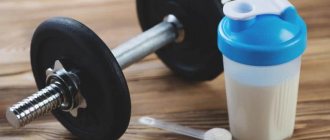Magnesium[edit | edit code]
Magnesium
is a mineral macroelement that is involved in bone formation, regulation of nervous tissue, carbohydrate metabolism and energy metabolism. Magnesium improves blood supply to the heart muscle, so it is necessary for older people. In some important processes, magnesium acts as a calcium antagonist; excess magnesium reduces calcium absorption. The optimal ratio of calcium and magnesium is 10:7, this ratio is supported by a common set of foods. With a lack of magnesium, irritability increases.
Taking a magnesium supplement (300 mg/day) lowers blood pressure by an average of 12 mmHg. Art.
The main functions of magnesium (Vertkin A.L. et al., 1997)
- Increasing the energy potential of the cell
- Strengthening metabolic processes
- Antagonism with calcium
- Formation of complexes with ATP molecules and activation of more than 300 enzymes, including all ATPases (Mg-dependence)
- Participation in protein synthesis
- Promoting muscle fiber relaxation
- Counteracting the uncoupling of oxidation from phosphorylation
- Participation in the synthesis of fatty acids and lipids
- Inhibition of acetylcholine release from the presynaptic terminal
- Regulation of glycolysis
- Participation in the synthesis and breakdown of nucleic acids
- Binding of norepinephrine in granules (inactivation and reserve)
- Energy exchange
- Plastic exchange
- Electrolyte metabolism
- Decrease in the level of Na+ and Ca2+ in the cell Increase in the level of K+ in the cell → Polarization of the cell membrane
Ways to saturate the body with magnesium
Saturation of the body with magnesium leads to the growth of muscle tissue, increased physical strength and endurance; relief of spasms, disappearance of headaches and muscle pain; relief from fatigue, anxiety, nervousness, irritability; improved sleep; strengthening the heart muscle; dilation of the bronchi and deepening of breathing.
It is useful to include magnesium-containing foods in your diet, such as wheat bran and sprouted wheat seeds;
walnuts, almonds and pine nuts; pumpkin, sunflower, sesame and flax seeds; chocolate and cocoa powder; lentils and beans; hard cheeses; cabbage, dried fruits, greens. People who train intensively or build a beautiful body will not be able to get the required dose of the element from food - they need to additionally take magnesium-containing complexes. Magnesium is an element of health, strength and perseverance!
Magnesium in bodybuilding[edit | edit code]
Magnesium has an important place in bodybuilding not only because it is supported by theoretical evidence, but recent studies have shown that supplementation with magnesium can improve training performance. The role of magnesium in bodybuilding is that it takes part in energy production and protein synthesis. In addition, large losses of magnesium occur with sweat. In this regard, athletes often cannot fully meet the body's magnesium needs from food sources.
Brilla and Haley of Western Washington University in Bellingham published a study where athletes took magnesium supplements during bodybuilding exercises. The findings showed that the athletes were able to increase their results in strength and weight gain. Although the significant effect on strength indicators is well proven, the effect of magnesium on muscle growth and testosterone increase remains questionable (in the absence of a dietary deficiency)
.
Given the above facts, magnesium is often included in sports nutrition, including ZMA.
Recommended doses for bodybuilding[edit | edit code]
The recommended daily dose of magnesium for men aged 19-30 years is 200-400 mg, and for men over 30 years old - 420 mg per day. The recommended dose for women aged 19-30 years is 310 mg, and for women over 30 years old - 320 mg.
Loading and reception mode for increasing strength[edit | edit code]
The Effect of Magnesium Citrate on Muscle Strength
Although several studies[1][2][3][4] have previously established the positive effects of magnesium supplementation in sports to improve strength performance, the optimal dosage regimen remains questionable. In a study by Lindsy S Kass[5], subjects took magnesium using two protocols:
- Group 1 took magnesium citrate orally at a dose of 300 mg/day for 1 week, 3 hours before training, or at any other time on non-training days.
- Group 2 took magnesium citrate in the same quantities, but for 4 weeks.
After 1 and 4 weeks, respectively, the subjects were tested, which consisted of a bicycle ride (40 km) and after 30 minutes performing a bench press to failure (80% 1RM). The same tests were repeated the next day.
Conclusions:
Magnesium increased strength performance by 17% on the day of testing in the group that took it for 1 week.
On the second day of testing, strength indicators also remained elevated. The group that took magnesium for 4 weeks did not show statistically significant changes in strength indicators. Thus, the authors believe that taking magnesium gives the maximum effect in increasing strength only in the first few days of use
, then this effect disappears.
Indications for use
In medicine, this drug is prescribed to regulate metabolism.
Direct indications for use:
- hypokalemia;
- hypomagnesemia;
- heart failure;
- heart rhythm disturbances;
- post-infarction state;
- angina pectoris;
- vegetative-vascular dystonia.
The medication can be prescribed for the following symptoms indicating electrolyte deficiency:
- cramps, spasms;
- nervousness;
- fast fatiguability;
- dizziness;
- premenstrual syndrome;
- constipation
Magnesium in sports[edit | edit code]
Magnesium, a mineral responsible for more than 400 metabolic reactions in the body, is touted as the best support for your exercise. One study linked magnesium intake to muscle strength. The experimental group of men were given 500 mg of magnesium daily - more than the recommended daily dose of 400 mg. The control group took 250 mg per day - significantly less than the daily dose. Both groups trained with weights for eight weeks and then had their leg strength measured. The men who took the supplement became stronger, while the control group remained the same. But most researchers are still not sure that magnesium helps increase strength. They emphasize that the level of magnesium in the athletes' bodies was not determined before the start of the study. This is an important point because supplementing with any nutrient that your body is deficient in will most often have a positive effect on health and athletic performance. Overall, experts have now concluded that magnesium supplementation has no effect on aerobic or muscle strength.
Combination[edit | edit code]
Magnesium supplements are often combined with calcium to improve nervous system and muscle function, including heart rate regulation.
Why magnesium is useful for athletes: differences from magnesium B6 and rules of administration
Magnesium is a mineral macronutrient found in foods of plant and animal origin. It is not synthesized in the human body, so it must come from outside. This is especially true for athletes who have an increased need for such a substance. It is associated not only with a lack of macronutrients in food, but also with increased consumption due to intense exercise.
As a sports nutrition, magnesium is involved in more than 400 metabolic reactions in the body. In sports, the macronutrient is also valued for its ability to influence muscle mass, but this is not the only beneficial effect of the supplement.
Magnesium in food[edit | edit code]
Foods rich in magnesium
Almost half of the daily requirement of magnesium is provided by cereals and cereal products. There is a lot of magnesium in legumes, nuts, leafy vegetables, blackberries, raspberries, and strawberries.
Magnesium content in some foods
| Product | Magnesium content , mg/100 g of product |
| Beans | 167 |
| Oatmeal | 133 |
| Buckwheat | 113 |
| Peas | 107 |
| Millet | 87 |
| Rye bread | 73 |
| Rice | 37 |
| Wheat flour bread | 31 |
| Beet | 22 |
| Potato | 17 |
| Carrot | 17 |
| Beef | 16 |
| Mutton | 15 |
| Whole milk | 14 |
| Egg (yolk) | 12 |
| Egg (white) | 12 |
| Onion | 12 |
| Cabbage | 12 |
The ratio of calcium and magnesium in some foods
| Product | Ca:Mg ratio |
| Beans | 1:1 |
| Oatmeal | 1:1,8 |
| Buckwheat | 1:2 |
| Peas | 1:1,7 |
| Millet | 1:2,6 |
| Rye bread | 1:2,5 |
| Rice | 1:1,3 |
| Wheat flour bread | 1:1,6 |
| Beet | 1:1 |
| Potato | 1:2 |
| Carrot | 1:0,5 |
| Beef | 1:5 |
| Mutton | 1:2 |
| Whole milk | 1:0,1 |
| Egg (yolk) | 1:0,1 |
| Egg (white) | 1:2 |
| Onion | 1:0,4 |
| Cabbage | 1:0,4 |
Implications for athletes
Thanks to the active ingredients, the positive effect of Asparkam for athletes is noticeable. Many weightlifters and runners choose it as a safe pharmaceutical medication to improve the quality of training and normal recovery after competitions. The drug is approved and does not belong to the class of steroids. It is quickly absorbed, the maximum concentration in the blood is reached 1-2 hours after administration. What is the reason for its positive effect?
A stressful state, increased stress on the heart, muscles, joints, and large loss of fluid lead to the depletion of nutrients in the cells. During normal physical activity, you can make up for the deficiency by adhering to a balanced diet. But for bodybuilders who are on special diets and subject their bodies to constant stress, this is quite difficult to do. In addition, although metals are contained in many available products, they are easily washed out of the body through urine and sweat. Athletes constantly suffer from large losses of electrolytes:
- during active activities, especially in the hot season;
- at the drying stage, which is accompanied by the use of diuretics;
- with weight gain and excessive water consumption.
It is important to monitor the level of metals in the blood and promptly compensate for their deficiency with dietary supplements and medications.
Magnesium deficiency is especially noticeable among bodybuilders. The macronutrient regulates protein metabolism, which means it is necessary for building muscle mass. It provides muscle tissue with energy, increases vascular elasticity, and increases stress resistance. Together with potassium, it regulates muscle contraction and relaxation. Macroelements increase endurance, physical activity, and relieve the unpleasant consequences of long hours of training.
Many bodybuilders suffer from night cramps, spasms, muscle congestion, and deterioration in joint mobility. Magnesium and potassium compounds help relieve these symptoms and improve reflexes and metabolic processes.
Maintaining electrolyte balance is important not only for weightlifters, but also for runners. In athletics, a lot of stress is placed on the heart and blood vessels. It is important to support the cardiovascular system with additional intake of electrolytes. Their lack can not only cause problems for the athlete during performances, causing muscle spasms and decreased performance. Deterioration of heart and vascular health during strenuous exercise is also a consequence of this deficiency.
Asparkam in bodybuilding and fitness is indicated as maintenance therapy in the following cases:
- with strict diets with insufficient vitamins, macro- and microelements;
- during drying or weight gain to maintain electrolyte balance;
- on the eve of competitions, during active training to increase endurance and performance;
- for spasms, convulsions;
- when training in hot conditions;
- during the recovery period;
- for the prevention of heart and nervous system diseases.
Sources[edit | edit code]
- Santos DA, Matias CN, Monteiro CP, Silva AM, Rocha PM, Minderico CS, et al. Magnesium intake is associated with strength performance in elite basketball, handball and volleyball players. Magnes Res. 2011;24:215–9.
- Matias CN, Santos DA, Monteiro CP, Silva AM, Raposo MDF, Martins F, et al. Magnesium and strength in elite judo athletes according to intracellular water changes. Magnes Res. 2010;23:138–41
- Dominguez LJ, Barbagallo M, Lauretani F, Bandinelli S, Bos A, Corsi AM, et al. Magnesium and muscle performance in older persons: the InCHIANTI study. Am J Clin Nutr. 2006;84:419–26.
- Brilla LR, Haley TF. Effect of magnesium supplementation on strength training in humans. J Am Coll Nutr. 1992;11:326–9.
- “The effect of acute vs chronic magnesium supplementation on exercise and recovery on resistance exercise, blood pressure and total peripheral resistance on normotensive adults” Lindsy S Kass and Filipe Poeira. Journal of the International Society of Sports Nutrition. 2020 12:19 DOI: 10.1186/s12970-015-0081-z© Kass and Poeira; licensee BioMed Central. 2015
Side effects
The medicine is approved in sports medicine. It is available from pharmacies without a prescription and is inexpensive. The availability and apparent harmlessness of the drug sometimes leads to unreasonable use. The use of the drug must be agreed with the attending physician or sports physician. You can take tablets only in the prescribed dosage and according to indications.
Side effects are extremely rare. They are caused by an overdose of Asparkam or individual intolerance to the components. Possible nausea, vomiting, stool disorders, stomach pain, feelings of heat, dry mouth, heartburn, allergic reactions. Unpleasant symptoms go away if you reduce the dose. It is worth considering that magnesium and potassium do not accumulate in cells for future use. Excess macroelements are excreted from the human body by the kidneys, thereby increasing the load on the organ. Renal failure is a direct contraindication for taking the medicine.








